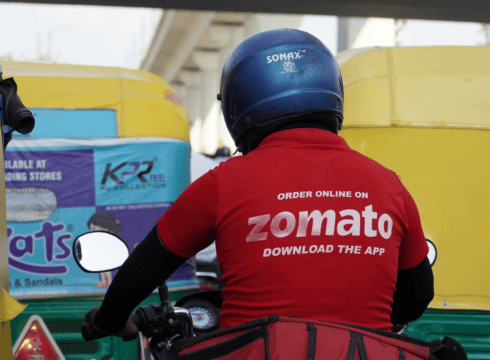Zomato reportedly plans to rope in ecommerce platforms to help them deliver food, pharma products and other consumer goods to users
The startup is reportedly charging between INR 10 to INR 15 per kilometre to its B2B clients
In the past, Zomato has unsuccessfully tried its hands at the private label nutraceuticals and grocery delivery business (before Blinkit acquisition)
Inc42 Daily Brief
Stay Ahead With Daily News & Analysis on India’s Tech & Startup Economy
Continuing its spree of pilot launches, foodtech giant Zomato is now reportedly piloting B2B (business-to-business) logistics services.
The Gurugram-based startup plans to rope in ecommerce platforms to help them deliver food, pharma products, and other consumer goods to customers, Moneycontrol reported citing sources.
The listed unicorn is also said to have already approached smaller food and grocery aggregators, pharmacies and consumer brands in the past 30-45 days to onboard them for the pilot run. Zomato is currently delivering ‘a few thousand’ orders a day under the trial programme, as per the report.
Zomato is said to be charging anywhere between INR 10 to INR 15 per kilometre to its B2B customers for the service.
Zomato declined to comment on the story.
Meanwhile, a senior executive of a platform which is in talks with Zomato for the service was quoted as saying that the foodtech major’s prices are pretty similar to that of other logistics players in the market.
“Zomato is not really offering a much different price point for the service as compared to other players in the market. Logistics is a commodity… What Zomato can offer to us is a great product which comes with a trained fleet, better delivery timelines. It won’t move the needle much for us from a cost-centre perspective,” said the executive.
The move to venture into the B2B logistics space could help Zomato improve its fleet utilisation and grow its scale as it looks to tap the underlying revenue opportunity. It could also be Zomato’s way of pre-empting any competition from other players as it looks to experiment in the hyperlocal domain.
The latest development comes days after Zomato’s quick-commerce arm Blinkit was in the middle of a storm last month after thousands of its delivery executives went on a strike in the Delhi-NCR region, demanding better payout structure and working conditions.
A Tale Of Pilots
The new pilot run comes in the middle of a slew of other such experiments, failed or otherwise, by Zomato in the past few years. Earlier, it ventured into the private label nutraceuticals business, but shut it down within six months of launch.
Prior to the acquisition of Blinkit, Zomato also unsuccessfully tried its hands at the grocery delivery business twice – in 2020 and then in 2021. Then, there was Zomato Wings, which connected budding restaurants to investors, that was also shut within a year of its launch.
Zomato’s new experiments have picked up pace after its acquisition of Blinkit. The quick-commerce vertical announced last year that it was launching print out deliveries for users and followed it up by unveiling electronic and other high-value product delivery from retail stores.
Earlier this year, it was also reported that Blinkit was mulling venturing into the at-home services space, on the lines of Urban Company, to scale up its offerings.
On the core business front, Zomato, in the recent past, piloted an inter-city food delivery service called Legends and also launched a home-cooked meals service for students and employees. While Legends is yet to be scaled up pan-India, the tiffin service-style service has now been clubbed with Zomato Gold subscription as against available-for-all before .
Zomato’s experiments come at a time when there are concerns about saturation of the metro cities-led food delivery market. The company witnessed a degrowth in its food delivery business in the quarter ended December 2022. Amidst all this, the startup has been struggling to turn profitable. Its net loss widened to INR 346.6 Cr in the December quarter of the financial year 2022-23.
Despite the hurdles, Zomato continues to be one of the biggest players in the foodtech arena and accounts for more than half of the market share. However, its pilot runs, in the domain outside the home industry, have largely hit a brick wall. With Zomato now looking to leverage its existing fleet of drivers to spruce up its revenue, the road ahead could yield some interesting results.
{{#name}}{{name}}{{/name}}{{^name}}-{{/name}}
{{#description}}{{description}}...{{/description}}{{^description}}-{{/description}}
Note: We at Inc42 take our ethics very seriously. More information about it can be found here.


